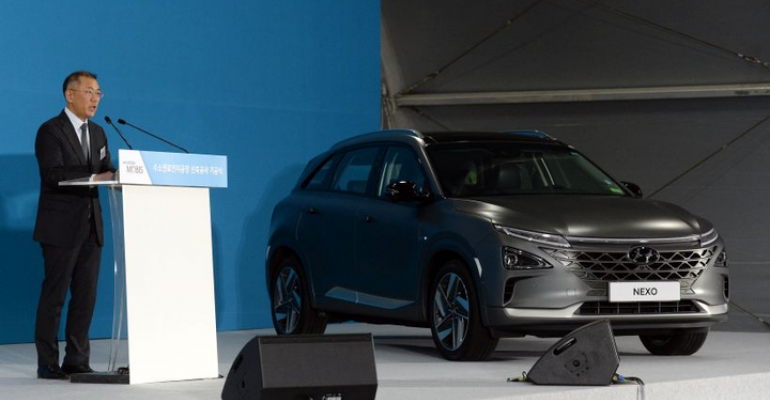Hyundai Executive Vice Chairman Euisun Chung marks his appointment as co-chairman of the Hydrogen Council with a call for increased international cooperation to help tackle global climate challenges.
The council is a global coalition of more than 50 energy, transport and industrial companies with a shared vision for hydrogen’s integral role in the transition to clean energy.
In a joint op-ed published on the official blog of the World Economic Forum during its annual meeting in Davos, Switzerland, Chung and co-chairman Benoit Potier of Air Liquide focused on the need for multilateral cooperation to realize the benefits of global hydrogen deployment.
They insisted public-private collaboration is the only way to move the hydrogen economy from an idea to a catalyst for the energy transition.
Earlier this year, Hyundai announced its FCEV Vision 2030 program that includes a plan to boost its annual fuel-cell systems production capacity to 700,000 units by 2030.
It also is looking for new business opportunities to supply its systems to other transportation, power-generation and storage-systems sectors.
Aligned to achieving the goals of the Paris Agreement with its ambitious efforts to combat climate change and adapt to its effects, the Hydrogen Council was launched at the World Economic Forum 2017 in Davos and is the first global initiative of its kind.
It works with governments, global agencies and the private sector to showcase the benefits of hydrogen technology while seeking to develop a strategic plan to accelerate major investment in the commercialization of hydrogen solutions on a global scale.
When produced from renewable and low-carbon sources such as solar and wind energy as well as carbon-capture storage technologies and solutions, hydrogen has zero carbon-dioxide emissions at the point of use.
Hyundai says a recent McKinsey report notes that at scale, hydrogen could meet 18% of the world’s energy demand.
The Hydrogen Council predicts annual demand for hydrogen will increase tenfold by 2050, creating jobs and bolstering economies.





